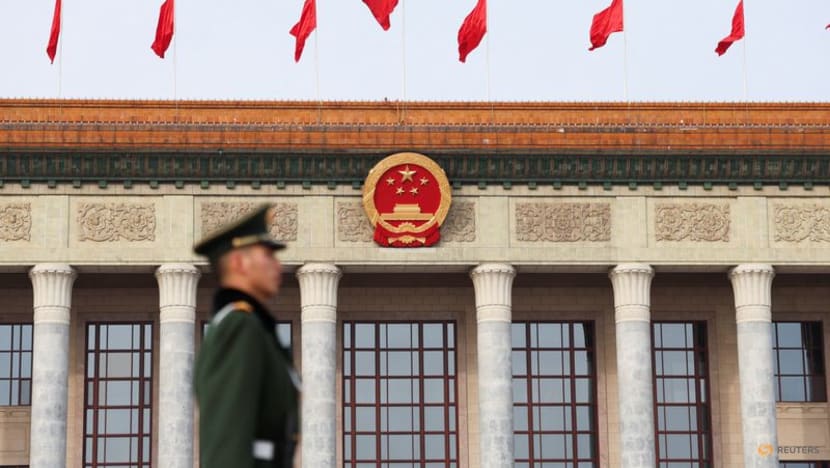‘Vague and broad’: China’s revised state secrets law sparks concerns from Taiwan and foreign businesses
The law saw its biggest tweaks in more than a decade, and only its second revision since its introduction in 1988.


This audio is generated by an AI tool.
SINGAPORE: China’s revised state secrets law has come into force, a move that has drawn concern over the potential risks of doing business in the country while also raising alarm bells in Taiwan.
Enacted on Wednesday (May 1), changes to the Law on Safeguarding State Secrets broaden the scope and depth of the legislation while also strengthening control by the ruling Chinese Communist Party (CCP).
Together, these are the biggest tweaks to the state secrets law in more than a decade, and the second revision since it was first introduced in 1988. A draft was made public in late October last year before being passed with minor edits by the country’s top legislative body in February.
Beijing has framed the changes as necessary in addressing the challenges of the day while analysts view them as a reflection of its overriding focus on national security.
“Even in the economic sector, the administration has indicated a willingness to prioritise national security over market expectations. The authorities see it as a response to a perceived new security landscape,” said Dr Lim Tai Wei, adjunct senior fellow at the National University of Singapore’s (NUS) East Asian Institute.
China’s security authority has increasingly sounded the alarm over growing spying risks from foreign intelligence agencies. The Ministry of State Security has also urged everyday citizens to be on guard, recently warning of “espionage traps” in online dating and job hunting.
The changes to the state secrets law are also part of the continuing control over the flow of information under President Xi Jinping’s leadership, said Associate Professor Chong Ja Ian from NUS’ Department of Political Science.
“The law is vague and broad. There is substantial uncertainty over its application and limits, including whether these remain more or less stable over time.
“Authorities and agencies have a wide remit in controlling information, bringing the full force of the state to bear if necessary.”
CRITICISMS AND CONCERNS
The amended legislation has sparked unease in Taiwan, with authorities issuing a fresh reminder this week for Taiwanese to be aware of the risks and avoid unnecessary travel to China.
The law's vague provisions increase uncertainty, which together with the low transparency of rule of law in China means the risk of Taiwanese travellers violating the law has significantly increased, Taiwan’s Mainland Affairs Council said as reported by local news outlet Focus Taiwan.
Taiwan’s reaction continues the wave of criticisms and concerns over China’s new state secrets law when proposed changes were publicly laid out in October last year.
Investors and foreign businesses then called for more clarity as they raised concerns about the heightened risks of doing business in China.
“Clarity on relevant terms … is essential for businesses to know where China’s red lines are - this should be a consideration when revising laws related to national security,” said the European Union Chamber of Commerce in China a day after the draft was made public.
WilmerHale, a United States-based law firm, said in March that the changes to the state secrets law created uncertainty and compliance challenges for businesses operating in China.
The law defines state secrets as matters “concerning national security and interests”, where disclosure could harm the country in areas like politics, the economy, defence and diplomacy.
The revised legislation also does not specify who is considered “personnel with access to state secrets”.
While this is believed to cover employees in various government bodies, CCP organisations, state-owned enterprises and the military, there has never been an official list of those groups and the law does not give a clear definition, stated a Nov 2023 article by the South China Morning Post (SCMP).
China had 7.1 million civil servants as of 2012, according to state news agency Xinhua.
It has taken similar steps in the name of strengthening national security.
Updates to its sweeping anti-spying law took effect in July last year, expanding China’s definition of espionage to include cyberattacks against state agencies and banning the transfer of any information related to national security, among other things.
That law also drew criticism from the US, which warned that foreign companies in China could be punished for regular business activities.
SAFEGUARDING NATIONAL SECURITY
Chinese officials have framed changes to the state secrets law as necessary to address what they say are fresh challenges in protecting state secrets.
"At present, the situation… is serious and complex, and the struggle between espionage and counterespionage is acute and complicated," said Mr Li Zhaozong, head of the National Administration of State Secrets Protection, when presenting the draft in October last year.
The remarks echo what President Xi said earlier that year when he urged officials to be ready to deal with “worst-case and most extreme scenarios”.
Related:
Late last month, Germany arrested four people on suspicion of spying for China. At the same time, two men were charged in the UK for similar offences. China has dismissed the spy claims, labelling them false and “malicious”.
According to China’s criminal law, whoever “steals, spies on, buys, or unlawfully supplies state secrets or intelligence for an overseas body, organisation or individual” can face life imprisonment.
State employees who “intentionally or negligently divulge state secrets” can be sentenced to up to seven years in prison, SCMP reported.
An Amnesty International report in 2021 claimed that “dozens of people” have been detained in China on charges related to state secrets since the law was introduced in 1988.
In 1993, Bai Weiji and Zhao Lei, a Chinese couple who formerly worked for the Chinese Foreign Ministry, were sentenced to 10 years and six years in prison respectively for “providing state secrets to a foreigner”.
Bai was accused of passing classified documents to the Washington Post’s Beijing correspondent while his wife was accused of translating some of the documents.
In 2006, Lu Jianhua, a Chinese sociologist with the Chinese Academy of Social Sciences, was sentenced behind closed doors to 20 years in jail for leaking state secrets.
His case was linked to that of Hong Kong journalist Ching Cheong, who at that time was chief China correspondent for The Straits Times.
Lu was accused of writing articles for Ching containing “top state secrets”. Ching himself was arrested in 2005 and sentenced to five years’ jail for spying before his release in 2008.
Ching published a book in 2013 recounting his incarceration, titled My 1,000 Days Ordeal: A Patriot's Torture.
According to an SCMP article, former Straits Times editor Leslie Fong, who was his immediate supervisor when he was arrested, said of the decision to publish the book: “Our stand on Ching Cheong is clear: we do not admit or accept the espionage charge levelled at him.”
Most recently, Chinese authorities claimed in January to have detained an individual alleged to be spying for Britain's foreign intelligence service. Officials did not specify whether this is under the anti-espionage or state secrets law.
Last October, it arrested a Japanese businessman who had been detained earlier on suspicion of espionage. Since 2015, Beijing has detained 17 Japanese nationals on charges of espionage and offences relating to national security, according to an Asahi Shimbun report.
UNPACKING THE REVISIONS
Some of the edits to China’s state secrets law are minor. For example, the first article adds the “great rejuvenation of the Chinese nation” as a driving factor for the legislation.
One new provision calls for the upholding of the CCP’s leadership in the work of safeguarding state secrets. A similar exhortation was included in recently passed amendments to legislation governing the State Council.
Other revisions have a clearer impact. For instance, international media outlets have highlighted a new provision on “work secrets” that requires government agencies and work units to protect pieces of information "that are not state secrets but will cause certain adverse effects if leaked".
Rules on the specific management of work secrets will be released separately, the legislation states, without giving a date.
“This enables PRC (People’s Republic of China) authorities at various levels substantial leeway to decide on what is a state secret. There seems to be little practical oversight or restraint on such exercises of executive authority,” Dr Chong told CNA.
Another revision tightens curbs on “personnel with access to state secrets”. They are already barred from travelling overseas without prior approval. This restriction now remains in place for an unspecified period even after they leave the job.
Dr Lim said these will likely tighten the net on information flows within China, especially among party, state and military personnel as well as individuals with access to sensitive information.
“Their departure from the country and employment with other organisations are scrutinised and curtailed,” he added.
Another amendment requires local governments - starting from the county level - to put aside money for the safeguarding of confidential information.
Public education on keeping state secrets will have to be part of the national system under the revised law. Mass media are encouraged to improve public awareness.
There is also a push to improve information security, with the provision of government support for the research and application of technology in this field.
Overall, the revised state secrets law is possibly “deliberately broad and amorphous”, Dr Lim told CNA. He noted that this is in line with other national security-linked legislation, including that in Hong Kong.
Citing how legal enforcers have targeted “non-traditional” national security sectors like private consultancies, Dr Lim added: “The broader scope gives security agencies more leeway to conduct their security enforcement.”

















